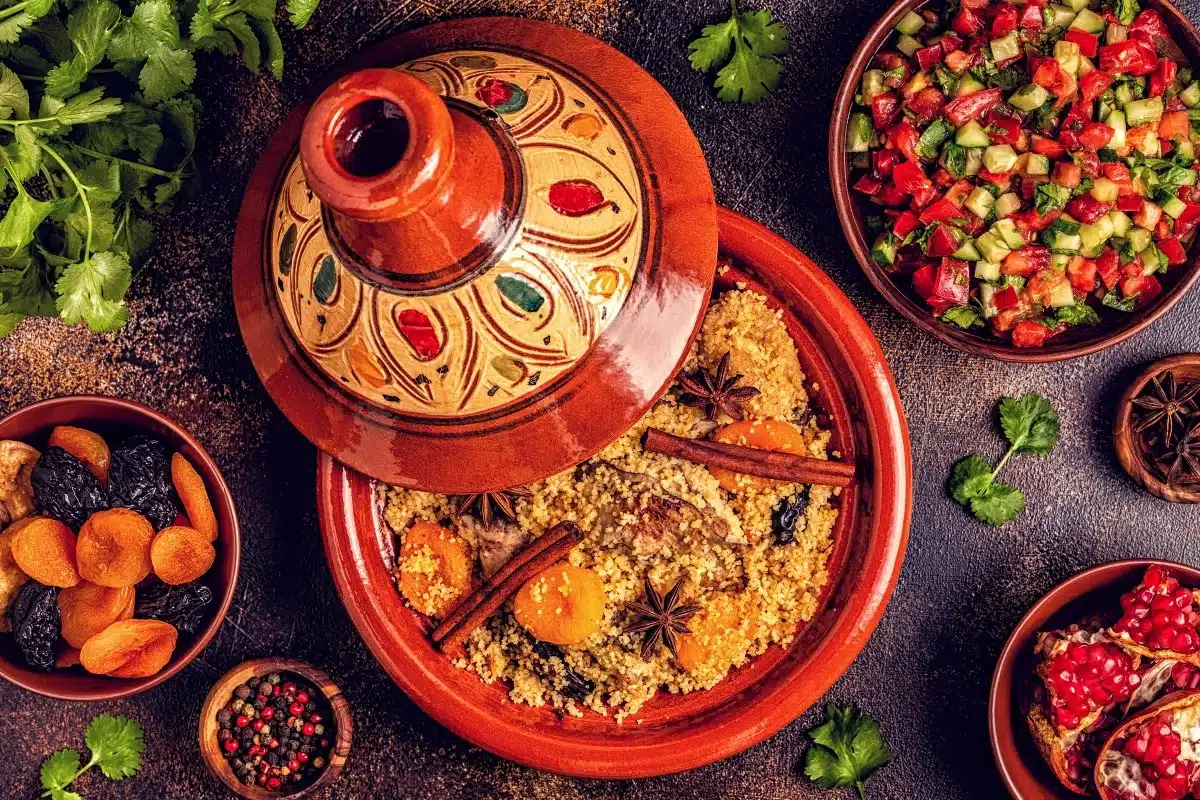Embark on a gastronomic adventure through Morocco, a land where the aroma of spices fills the air, and each dish tells a story of cultural fusion. Moroccan cuisine, a blend of Berber, Arab, Andalusian, and Mediterranean influences, offers an array of flavors that tantalize the taste buds. This guide will take you through the heart of Morocco’s culinary landscape, exploring its rich flavors, traditional cooking methods, and the cultural significance behind its most celebrated dishes.
1. Tagine
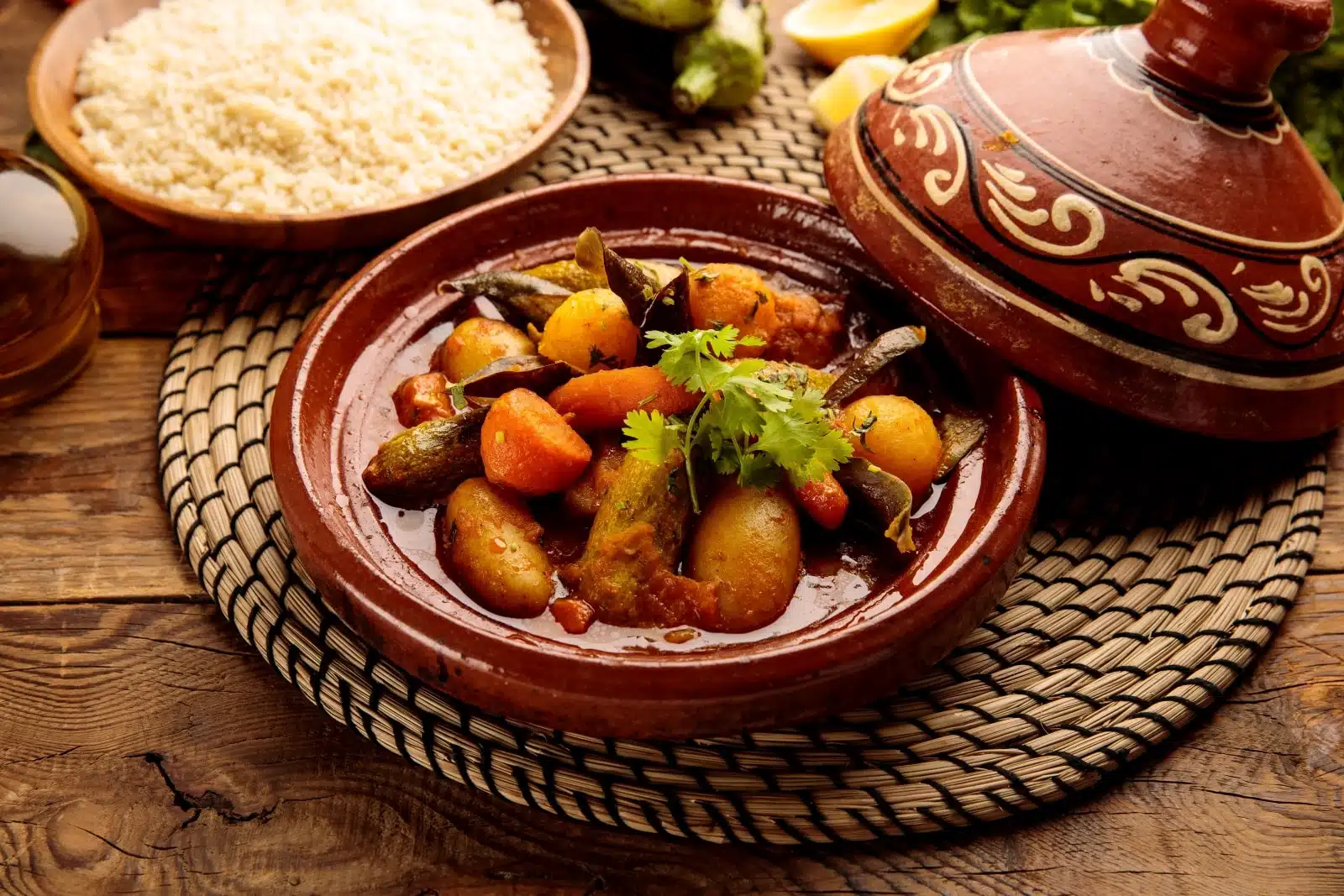
Image Credit: Shutterstock / Food Shop
In the heart of Moroccan cuisine lies the tagine, a slow-cooked stew that is as much a feast for the eyes as it is for the palate. This iconic dish, named after the earthenware pot it’s cooked in, encapsulates the essence of Moroccan cooking. The process is an art form, combining meats, poultry, or fish with a medley of vegetables, fruits, and spices, slow-cooked to tender perfection. Each region boasts its own version, from the sweet and savory lamb tagine with apricots of Marrakech to the spicy fish tagine of the coastal areas. The spices, including cumin, cinnamon, and saffron, are the soul of the dish, infusing it with rich, deep flavors that have been perfected over generations. As you lift the lid of a steaming tagine, you’re greeted with an aroma that is the essence of Moroccan hospitality. Dining on tagine is not just about savoring a meal; it’s about experiencing a tradition deeply woven into the fabric of Moroccan life.
Insider’s Tip
To truly experience the essence of a Moroccan tagine, seek out a local family-run eatery where dishes are slow-cooked to perfection.
2. Couscous
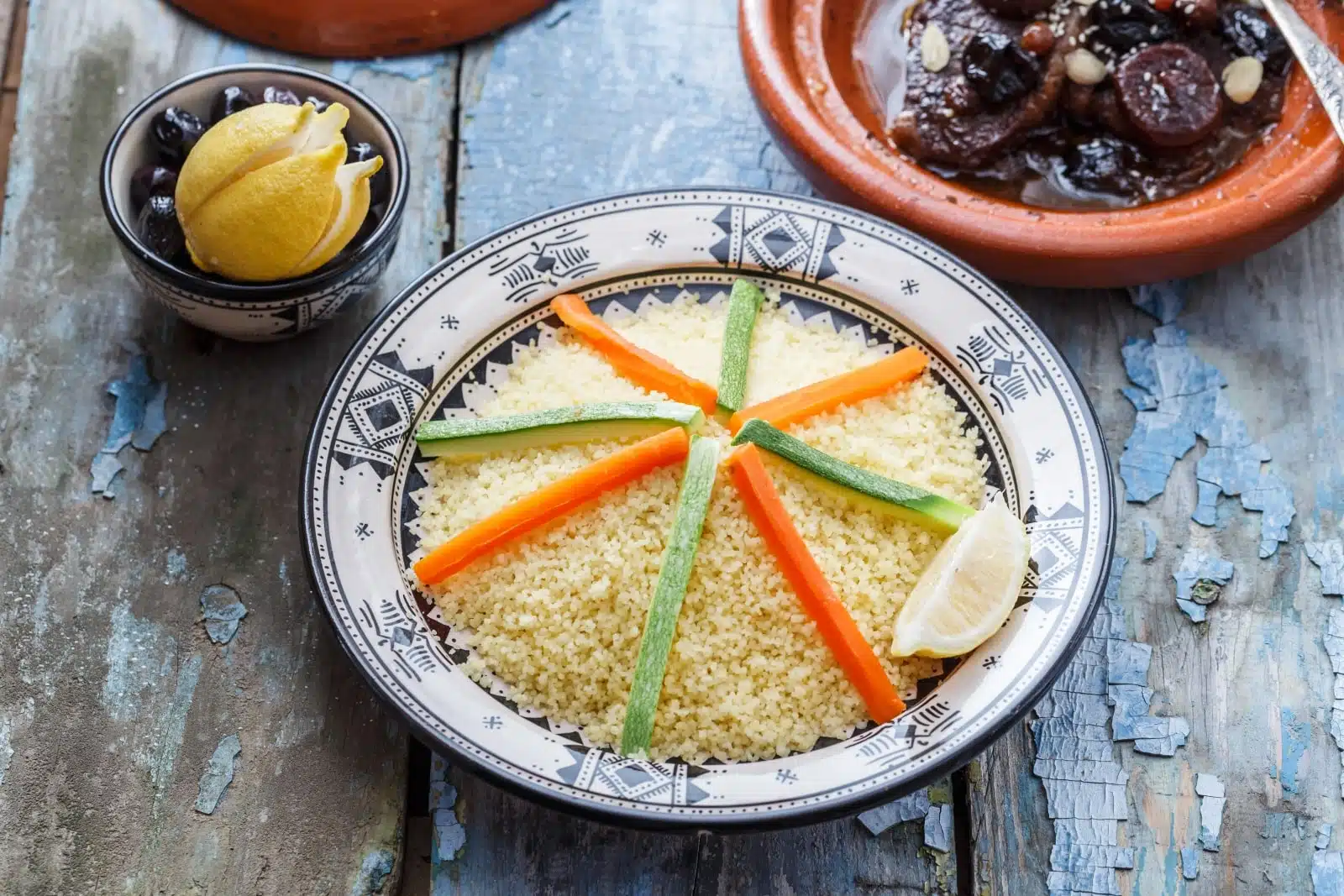
Image Credit: Shutterstock / Konstantin Kopachinsky
Couscous, the granular staple of North African cuisine, is honored in Moroccan culinary tradition. Far from being a mere side dish, it is a cultural icon, often gracing tables during significant celebrations and family gatherings. The preparation of couscous is a time-honored ritual involving steaming semolina grains over a stew until they become light and fluffy. This dish is typically served with a rich, flavorful broth, tender vegetables, and sometimes meat or fish. The key to its unique texture and taste lies in the hand-rolling technique passed down through generations. In Morocco, couscous is a symbol of togetherness and joy. Eating couscous on a Friday, the traditional day for this dish offers a glimpse into the Moroccan way of life, where food is a celebration and a way to unite people.
Insider’s Tip
For an authentic couscous experience, visit Morocco on a Friday when this dish is traditionally prepared and enjoyed as a communal meal.
3. Moroccan Mint Tea
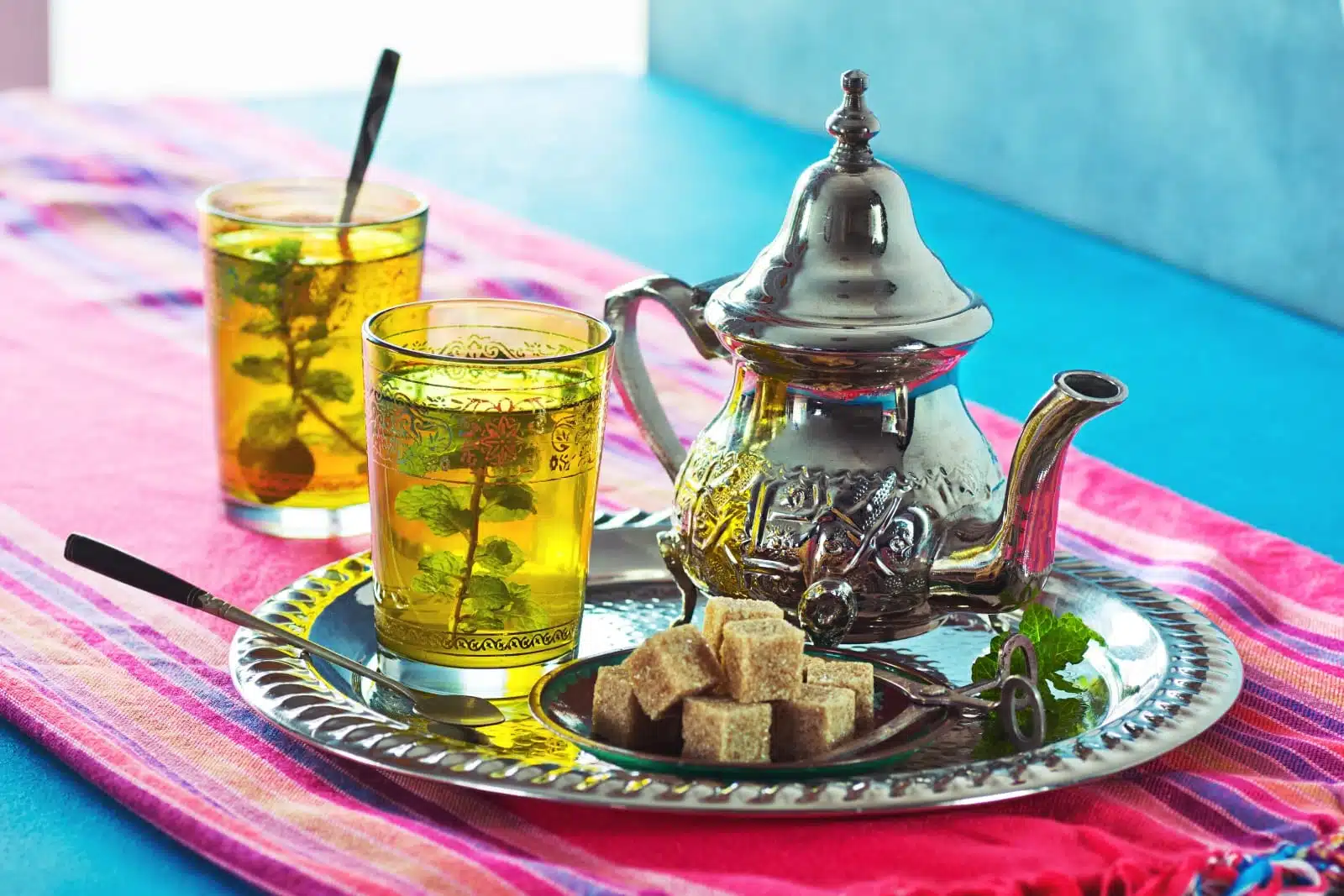
Image Credit: Shutterstock / viennetta
Moroccan mint tea, often called ‘Moroccan whiskey’ for its importance in local culture, is much more than a simple beverage. It’s a symbol of hospitality, friendship, and tradition. This sweet, minty tea is typically prepared in a decorative teapot and poured from a height to create a light foam on top. The ritual of tea-making and drinking is an art form, often performed with great skill and ceremony. It’s expected to be offered mint tea wherever you go in Morocco, from shops to homes, symbolizing a warm welcome. The tea is usually a blend of green tea and fresh mint leaves, sweetened generously with sugar. This refreshing drink is not just a thirst quencher; it’s a vital part of social interaction, a moment to pause and connect. As you sip this aromatic brew in a bustling market or a tranquil riad, you’re not just tasting a local delicacy but partaking in an age-old tradition central to Moroccan life. Sharing mint tea transcends cultural barriers, making it a unifying element in the diverse landscape of Moroccan society.
Insider’s Tip
Accepting a cup of mint tea is more than a refreshment; it’s an entry into Moroccan culture and hospitality.
4. Street Food in Marrakech
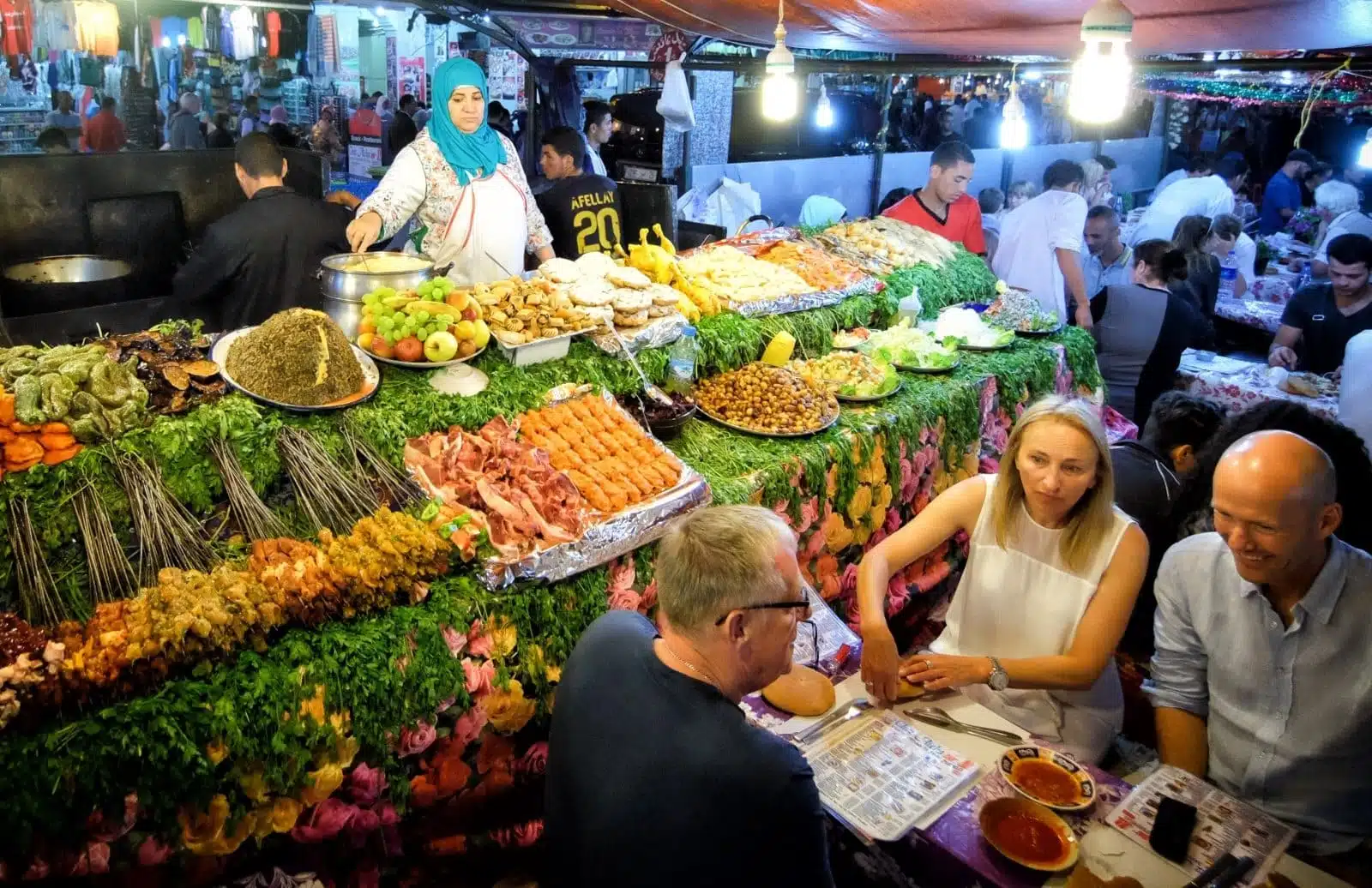
Image Credit: Shutterstock / Calin Stan
Marrakech’s street food scene is an exhilarating foray into the heart of Moroccan cuisine. The city’s bustling souks and lively squares, like the famous Jemaa el-Fnaa, become open-air kitchens as the sun sets. Here, you’ll find an array of street food that offers a taste of the country’s culinary diversity. From sizzling kebabs and spicy merguez sausages to snail soup and sheep’s head, the choices are as daring as they are delicious. Each vendor has a unique story, often serving recipes passed down through generations. The food is prepared right in front of you, offering not just a meal but a show. This is where you’ll experience the real Morocco, among the locals, with bold and authentic flavors. The street food in Marrakech is a journey through the country’s rich cultural and culinary heritage, a must-do for any food enthusiast seeking an authentic Moroccan experience.
Insider’s Tip
Venture beyond the main squares to smaller streets where locals dine for the most authentic and flavorful street food.
5. Moroccan Pastries
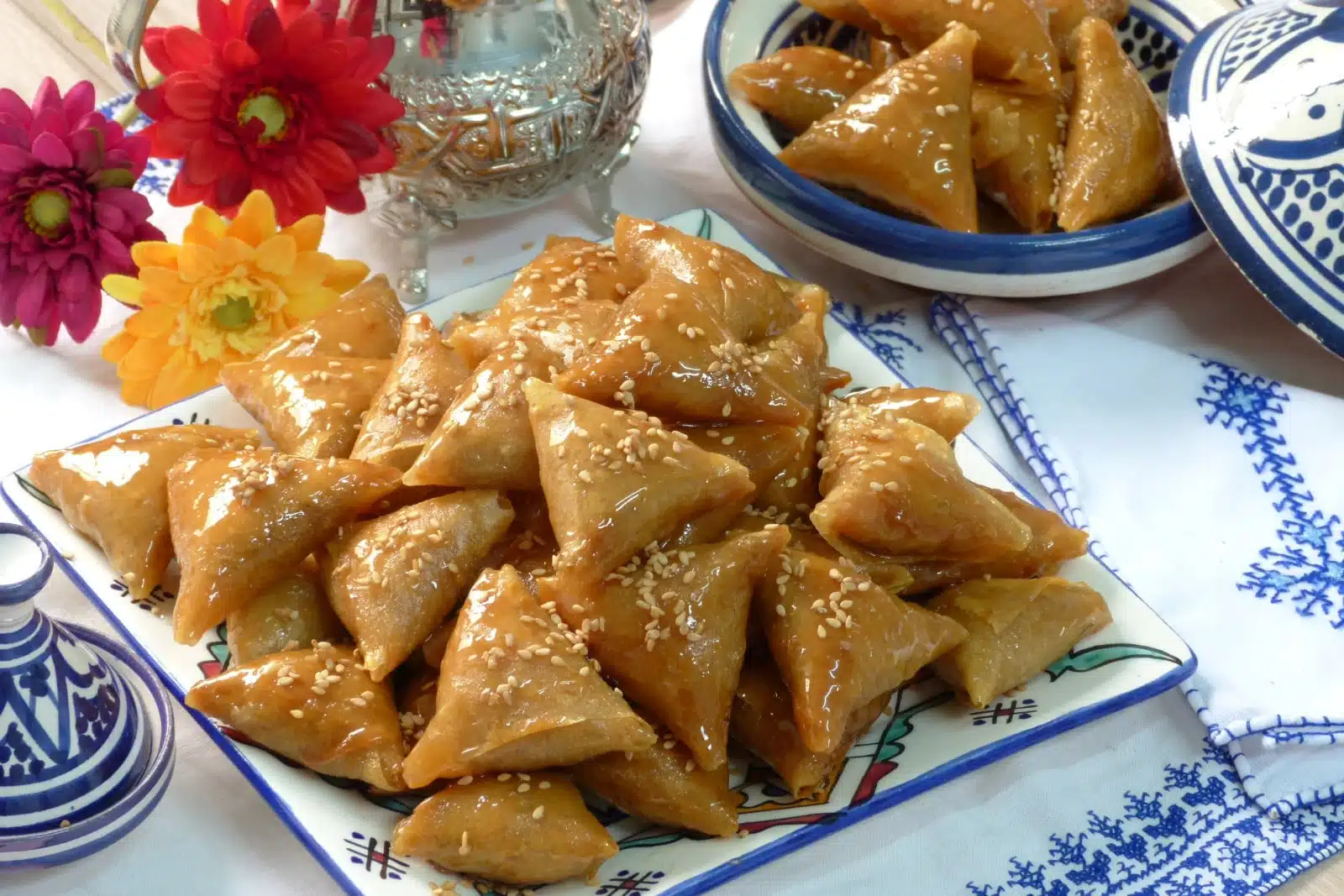
Image Credit: Shutterstock / Oumaima Bachiri
The world of Moroccan pastries is a delightful exploration of taste and texture. These sweet treats are integral to Moroccan cuisine, reflecting the country’s love for rich, honey-soaked desserts. From the flaky layers of baklava to the almond-filled crescents of cornes de gazelle, each pastry is a masterpiece of flavor. Using ingredients like orange blossom water, rose water, and various nuts adds a unique dimension to these desserts. Moroccan pastries are often enjoyed with mint tea, creating a perfect balance of sweet and refreshing flavors. Visiting a traditional Moroccan bakery or a local market, you’ll be greeted with various delicacies, each telling its own story of regional influences and family traditions. Making these pastries is as intricate as their flavors, often involving delicate folding techniques and slow baking to achieve the perfect texture. These sweets are not just desserts; they celebrate Moroccan artistry and hospitality. Indulging in these pastries offers a window into the soul of Moroccan culture, where food is an expression of love and a means of preserving heritage.
Insider’s Tip
Pair your Moroccan pastry with a glass of mint tea for a truly local experience.
6. Cooking Classes
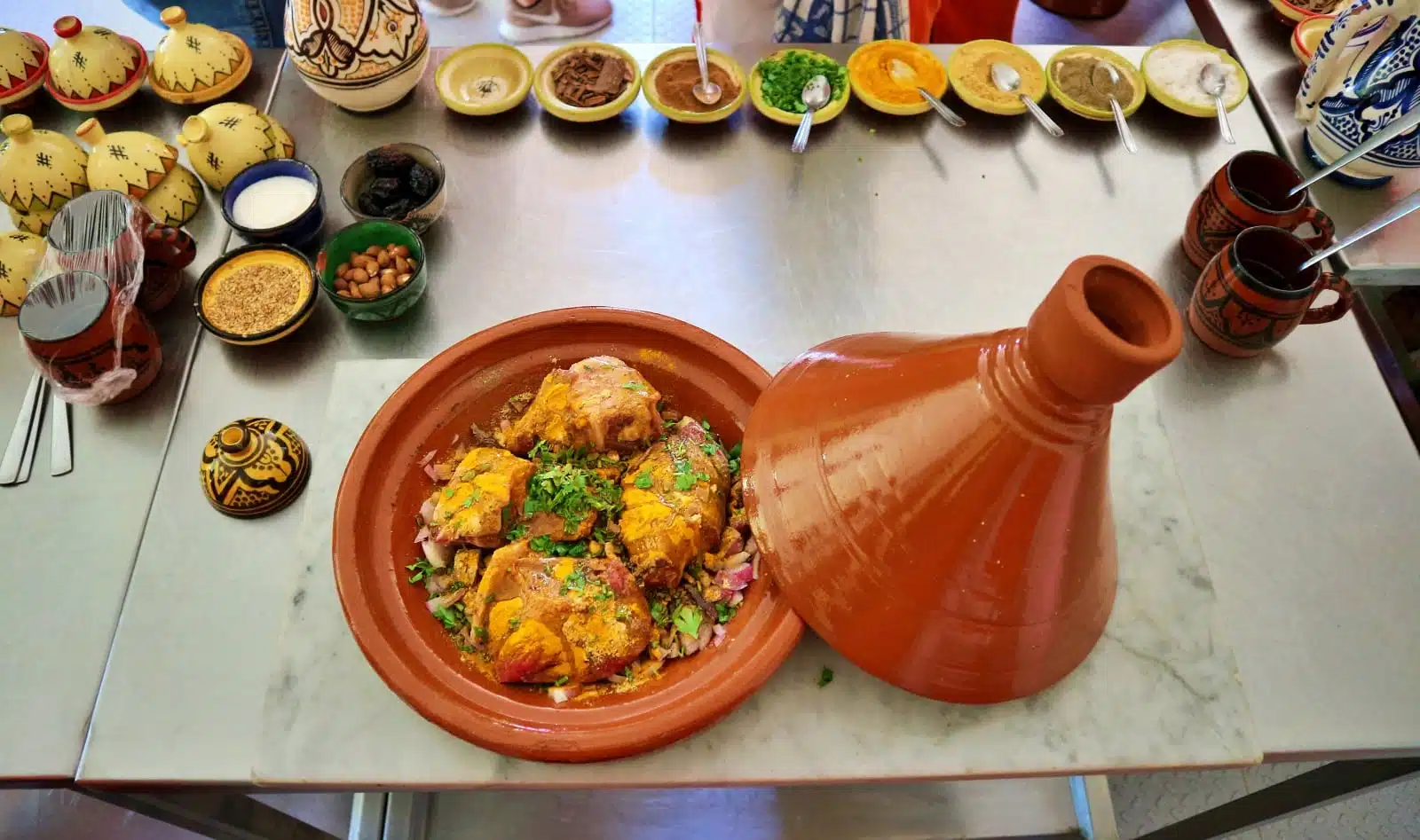
Image Credit: Shutterstock / lmascaretti
Taking a cooking class in Morocco is an immersive experience that goes beyond the boundaries of typical tourist activities. It’s an opportunity to delve into the heart of Moroccan culture and cuisine. These classes often start with a visit to a local market, where you’ll learn to select the freshest ingredients, from vibrant vegetables to aromatic spices. Under the guidance of a skilled chef, you’ll discover the secrets of Moroccan cooking techniques, from the perfect way to brew mint tea to the art of making a traditional tagine. These hands-on classes allow you to experience the joy of cooking and the satisfaction of enjoying your creations. More than just a cooking lesson, it’s a cultural exchange, offering insights into Moroccan family life and traditions. You’ll leave with stories and memories that enrich your understanding of Morocco and its people.
Insider’s Tip
Choose a cooking class that includes a market visit for a comprehensive understanding of the ingredients used in Moroccan cooking.
7. Seafood in Coastal Towns
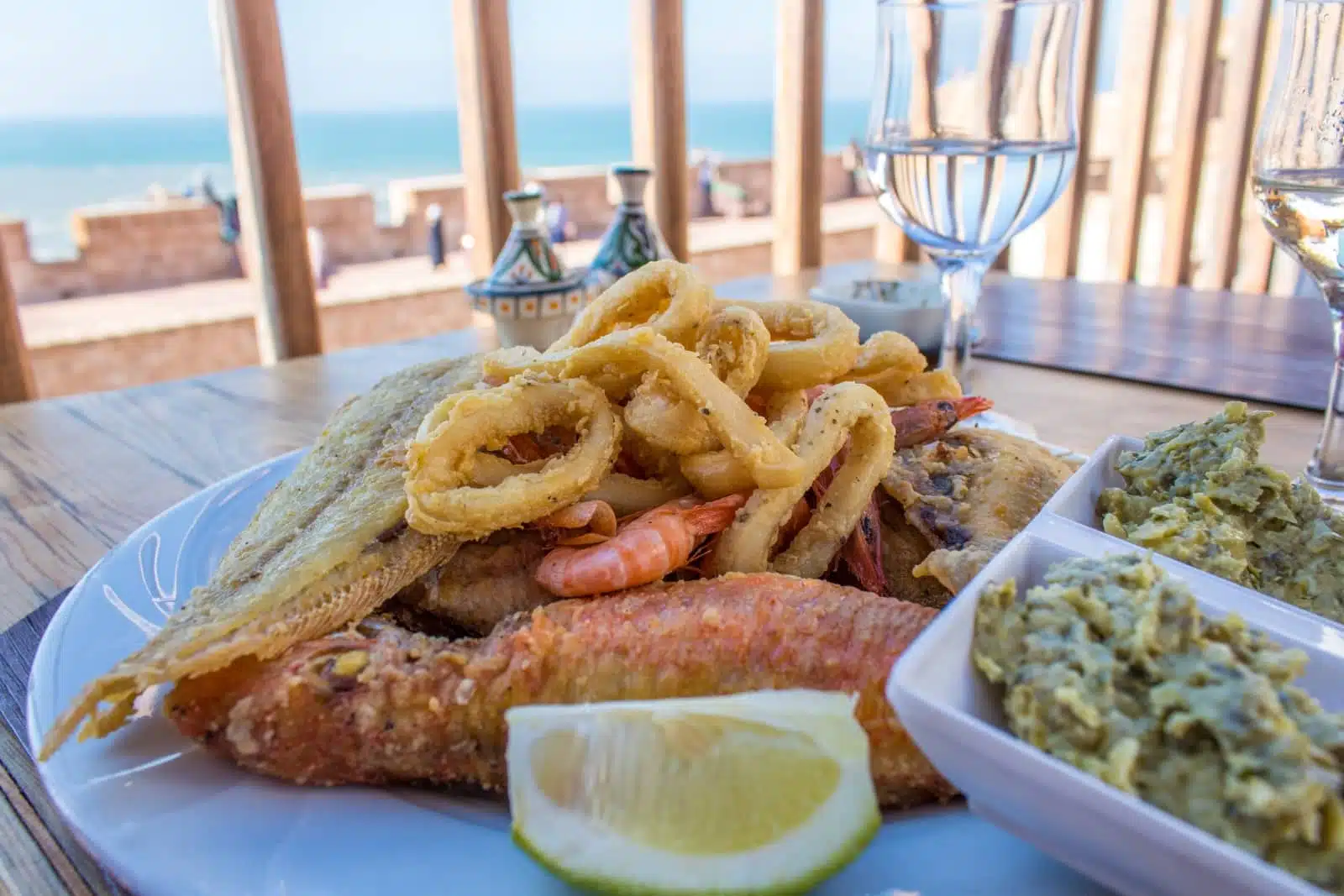
Image Credit: Shutterstock / Kamil Kaczmarczyk
Morocco’s coastal towns, from the bustling port of Essaouira to the Mediterranean charm of Tangier, offer a seafood experience that is as fresh as it is diverse. The proximity to the sea means that the seafood here is often caught the same day it’s served. Local specialties include grilled sardines, seafood tagines, and fish couscous, each reflecting the region’s unique flavors. The experience of eating seafood in these towns is deeply authentic, often involving simple, rustic eateries whose focus is on the freshness and quality of the ingredients. Strolling through a local fish market, you’ll witness the day’s catch being brought in, highlighting the town’s connection to the sea. Dining on seafood in these coastal towns is not just a meal; it’s a celebration of Morocco’s maritime heritage, offering a taste of the local lifestyle and the bounty of the Atlantic and Mediterranean waters.
Insider’s Tip
Visit the local fish markets early in the morning for the freshest catch of the day.
8. Moroccan Spices
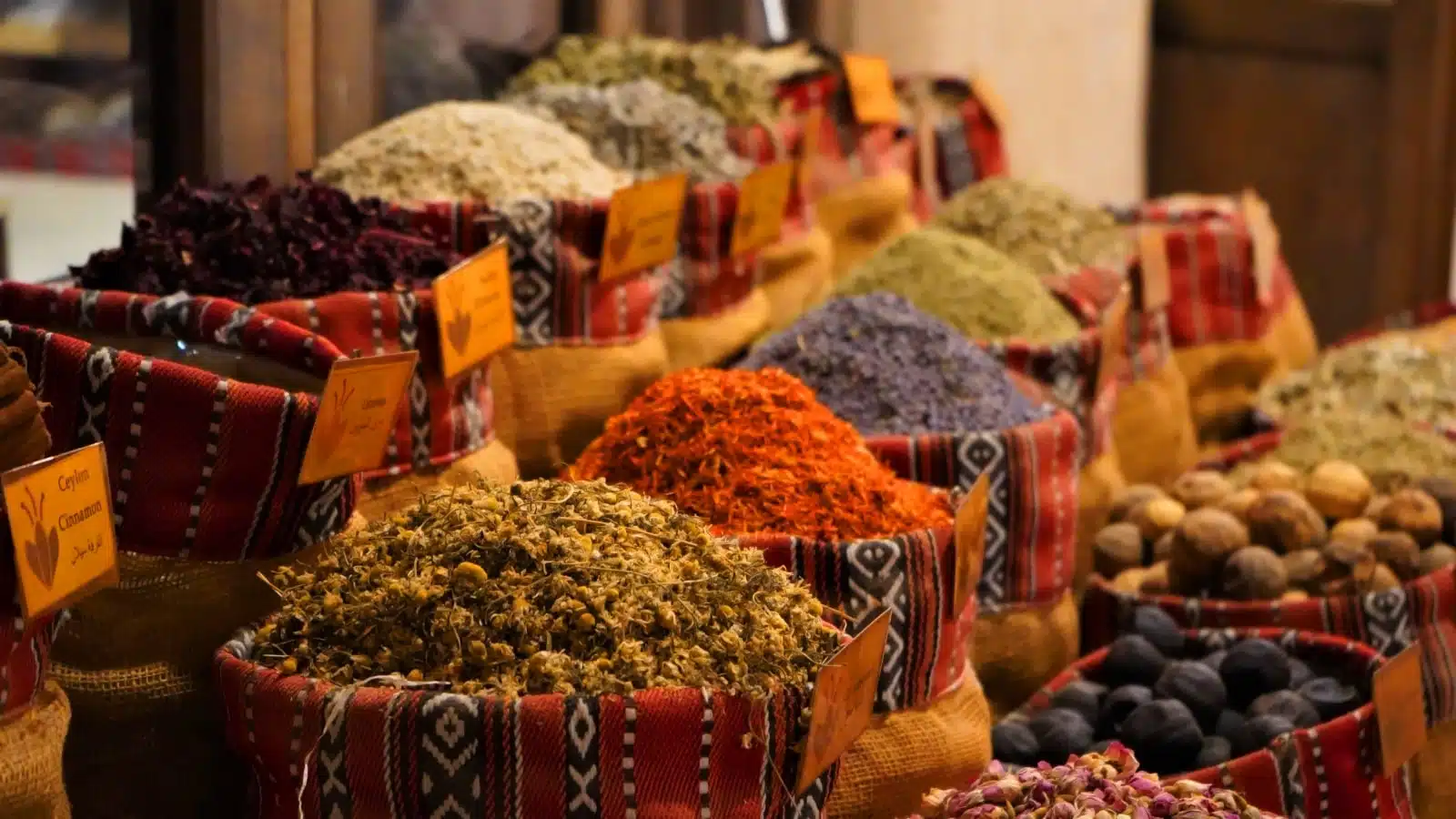
Image Credit: Shutterstock / Sayf Rover
Exploring the world of Moroccan spices is like stepping into a kaleidoscope of flavors and aromas. In Morocco, spices are the foundation of cooking, used for their taste and healing properties. The bustling spice markets, or souks, are a sensory overload, with vendors proudly displaying mounds of saffron, cumin, cinnamon, and ras el hanout, a signature blend of up to 30 spices. Navigating these markets is an experience where each spice tells a story of trade routes, traditional medicine, and culinary artistry. Understanding the nuances of these spices is key to appreciating Moroccan cuisine. They are used subtly, balancing flavors rather than overpowering the dish. A visit to a spice market, perhaps accompanied by a local guide, offers a chance to buy these aromatic treasures and learn about their role in Moroccan culture and cuisine. The spices of Morocco are more than just ingredients; they are a bridge to the past and a key to unlocking the secrets of one of the world’s most fascinating culinary landscapes.
Insider’s Tip
Explore local spice markets with a knowledgeable guide to learn about the uses and benefits of different spices.
9. Traditional Moroccan Breakfast
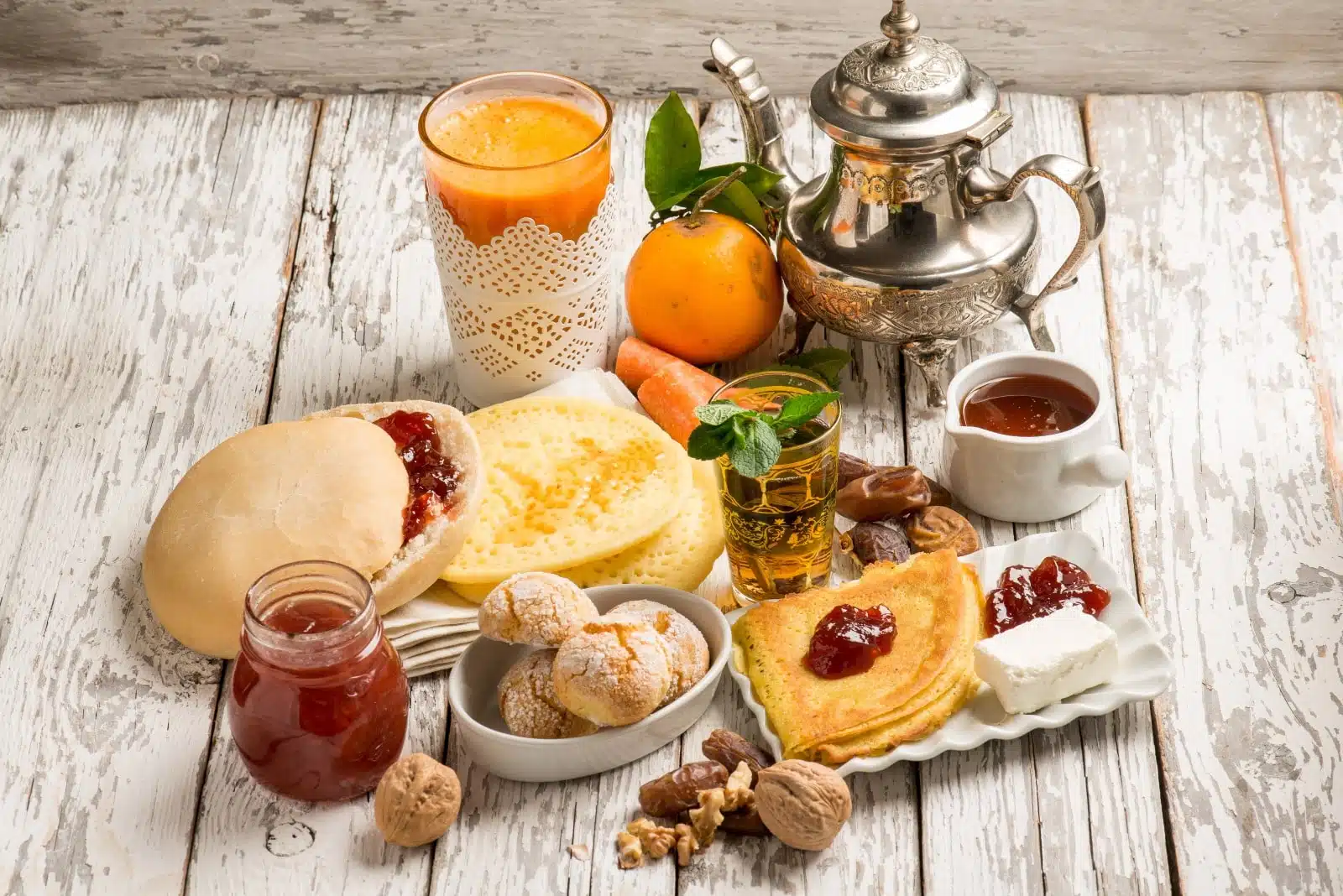
Image Credit: Shutterstock / marco mayer
A traditional Moroccan breakfast is an array of flavors and textures, offering a hearty start to the day. Unlike the Western concept of a quick morning meal, breakfast in Morocco is a leisurely affair, often stretching for hours, especially on weekends. The spread includes freshly baked bread like khobz or msemen, served with various jams, honey, and amlou, a delicious almond and argan oil spread. Olives, cheese, and harira, a rich lentil and tomato soup, might also be part of the meal. This is not just breakfast; it’s a daily ritual that brings families together, a time for sharing and enjoying life’s simple pleasures. Enjoying a traditional Moroccan breakfast, especially in a local Riad, allows you to start your day immersed in the culture, tasting the freshness and wholesomeness of Moroccan home cooking.
Insider’s Tip
Try a traditional Moroccan breakfast in a local Riad for an authentic and serene morning experience.
10. Olive Oil and Olives
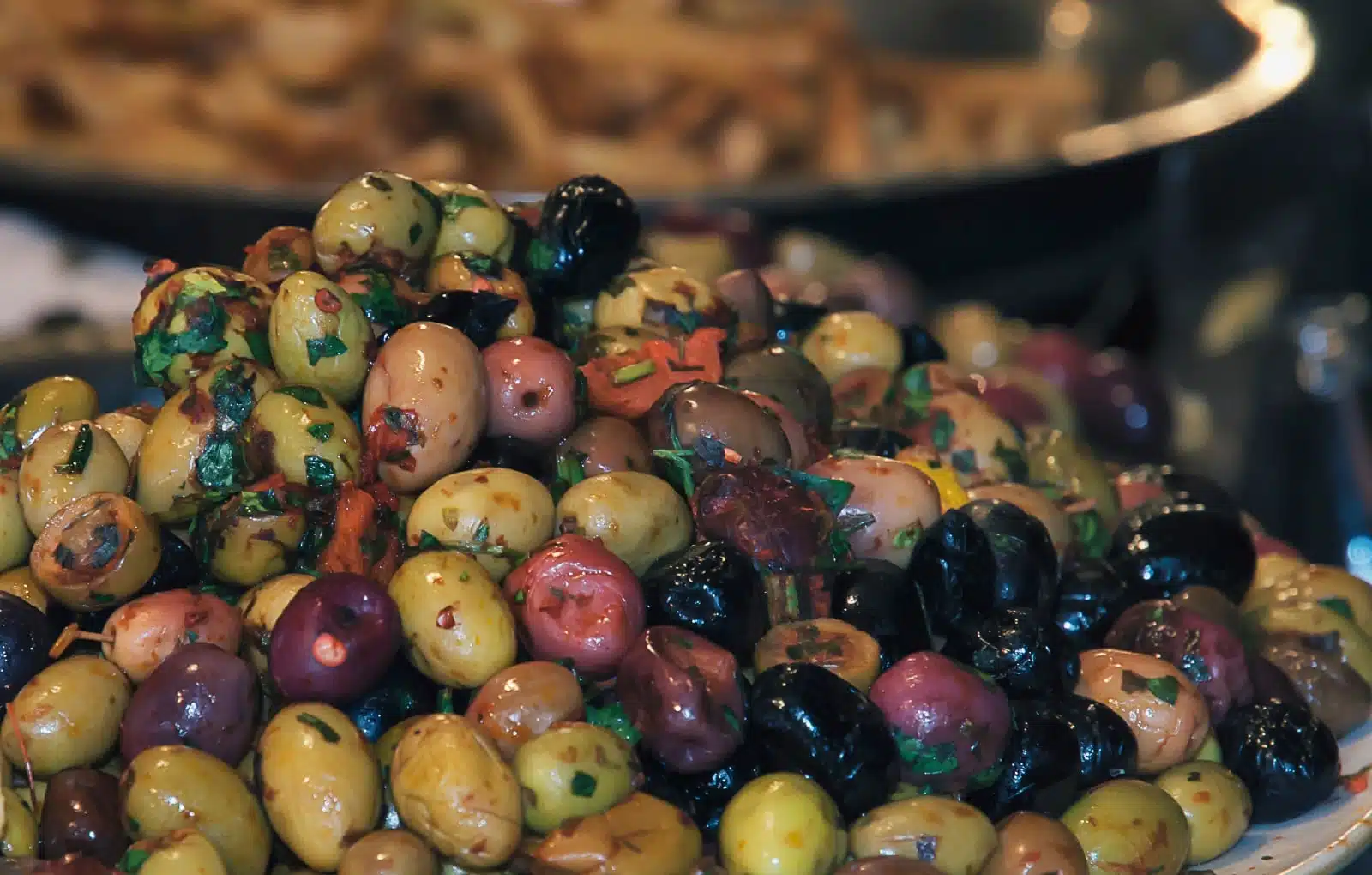
Image Credit: Shutterstock / VSM Fotografia
In Morocco, olive oil and olives are not mere ingredients but culinary treasures deeply embedded in the country’s food culture. The olive groves of Morocco, stretching across the landscape, showcase the importance of olives in the local diet. Moroccan olive oil, known for its rich flavor and high quality, is a staple in cooking, used for everything from frying to dressing salads. The olives themselves, whether green or black, are often served as a starter or a side, sometimes stuffed or flavored with herbs and spices. Visiting an olive grove or an oil press, especially during the harvest season, offers a glimpse into the production process, from picking to pressing. Tasting freshly pressed olive oil is a revelation, with a vibrant and pure flavor, like experiencing olives for the first time. Morocco’s olives and olive oil symbolize the country’s agricultural heritage, a link to the land and its bountiful gifts.
Insider’s Tip
Visit an olive grove and press during harvest to witness the production process and taste freshly pressed olive oil.
11. Moroccan Salads
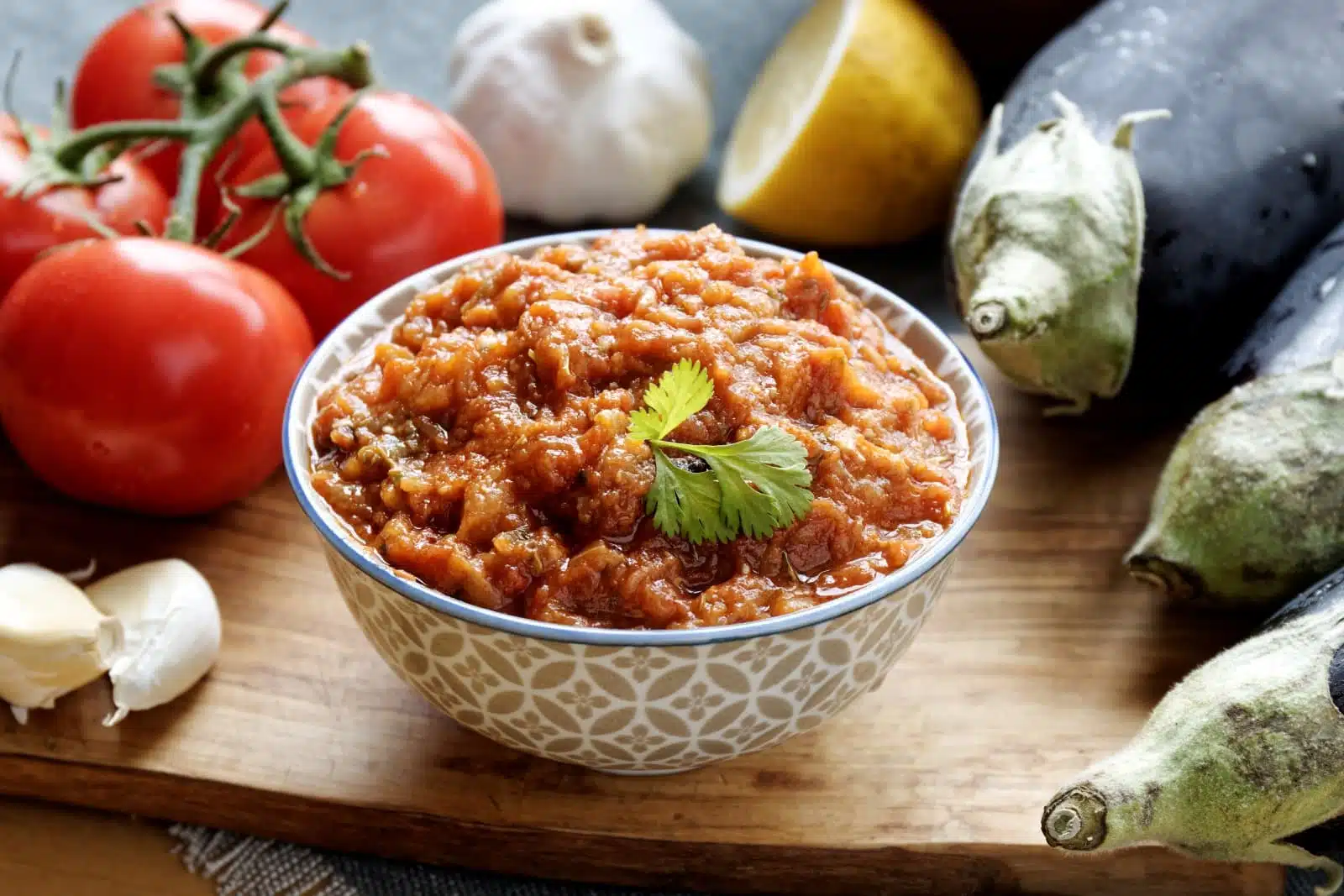
Image Credit: Shutterstock / Fotema
Moroccan salads are a vibrant and essential part of the culinary landscape, offering a refreshing contrast to the rich, hearty flavors of the main dishes. Unlike the typical Western salad, Moroccan salads are often cooked and spiced, featuring a variety of vegetables like tomatoes, eggplants, and bell peppers. Zaalouk, a smoky eggplant and tomato salad, and Taktouka, a blend of roasted peppers, tomatoes, and garlic, are popular choices. These salads celebrate Morocco’s abundant produce, showcasing the simplicity and purity of the ingredients. Eating these salads is not just a palate cleanser; it’s an experience of the country’s agricultural diversity. Each salad tells a story of regional preferences and family traditions, often passed down through generations. Sampling a range of Moroccan salads, perhaps in a local café or as part of a larger meal, provides a delicious insight into the everyday eating habits of Moroccans and the country’s rich culinary heritage.
Insider’s Tip
Sample a variety of Moroccan salads at a local ‘salad bar’ to appreciate the diversity of flavors and ingredients.
12. Festive Dishes
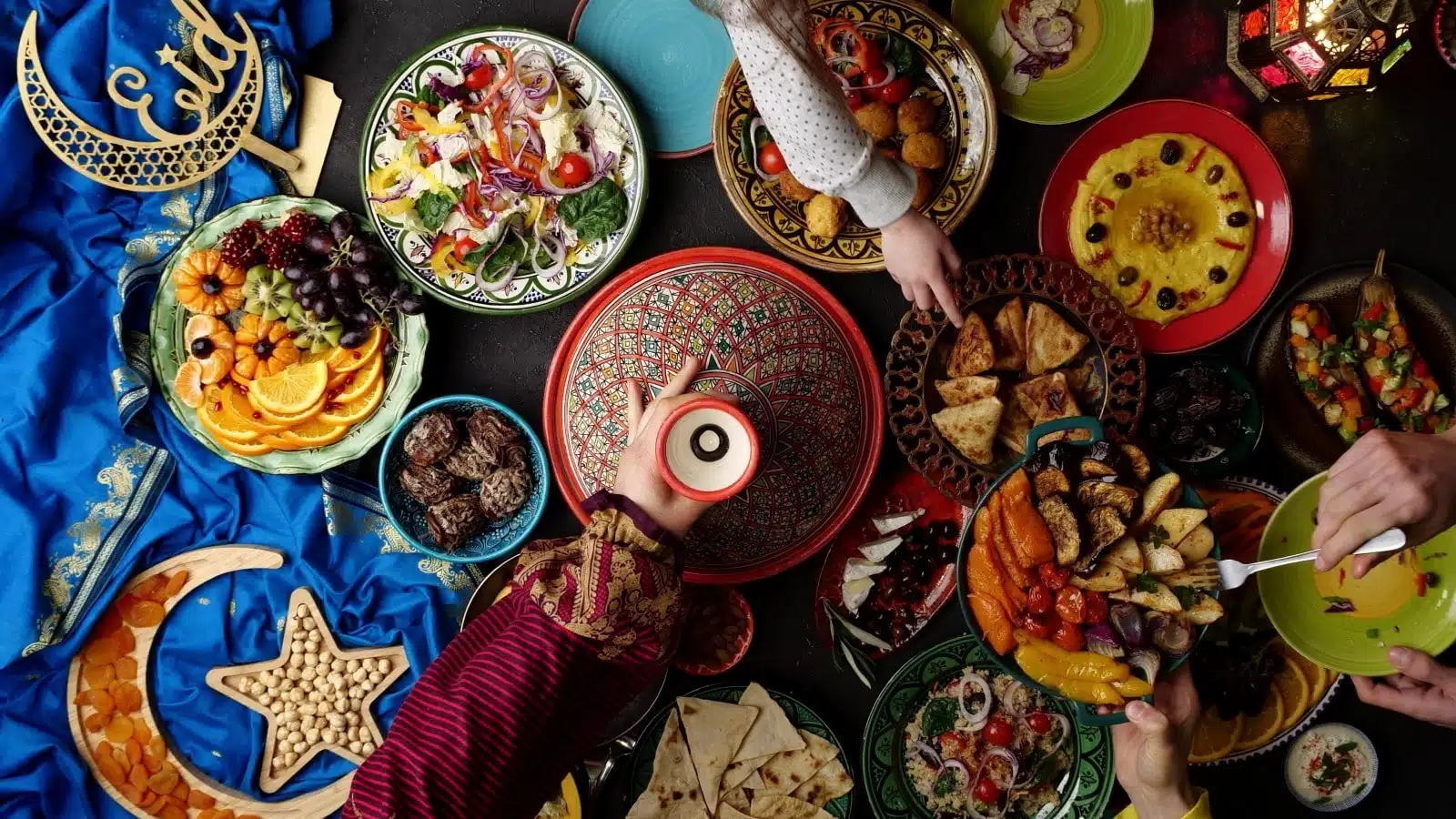
Image Credit: Shutterstock / Fevziie
In Morocco, food is an integral part of any celebration, and festive dishes are prepared with great care and affection. During religious and national festivals, special dishes take center stage, each with its own significance and history. Eid al-Fitr, marking the end of Ramadan, is celebrated with dishes like Mechoui, a whole roasted lamb, and Bstilla, a sumptuous pie filled with pigeon or chicken, almonds, and spices, wrapped in flaky pastry. Another significant dish is Rfissa, traditionally served during celebrations like weddings and births, featuring shredded bread, chicken, lentils, and a medley of spices. These dishes are not just meals; they are a part of the celebration, bringing families and communities together. Participating in a Moroccan festival and savoring these dishes offers a unique opportunity to experience the country’s culture and traditions at their most vibrant and joyful.
Insider’s Tip
Plan your visit during a Moroccan festival to experience the special dishes integral to the celebration.
The Bottom Line
Moroccan cuisine is a journey of flavors, each dish a story, and every bite an experience. As you explore Moroccan food’s exotic and aromatic world where, you savor centuries of tradition and cultural fusion. So, embrace the adventure, indulge in the flavors, and let Morocco’s culinary delights enrich your travel experience. Bon appétit, or as they say in Morocco, “Bssaha”!
More From The Green Voyage
Top 10 Trending Travel Destinations 2024
6 Essential Banking Apps for International Travel – Managing Your Finances on the Go
Traveling With Kids – 10 Tips to Create Memorable Family Holidays
The post 12 Culinary Journeys Through Morocco 2024 first appeared on The Green Voyage.
Featured Image Credit: Shutterstock / Tatiana Bralnina.
Tips for Trip Success
Book Your Flight
Find an inexpensive flight by using Kayak, a favorite of ours because it regularly returns less expensive flight options from a variety of airlines.
Book Your Hotel or Special Accommodation
We are big fans of Booking.com. We like their review system and photos. If we want to see more reviews and additional booking options, we go to Expedia.
You Need Travel Insurance!
Good travel insurance means having total peace of mind. Travel insurance protects you when your medical insurance often will not and better than what you get from your credit card. It will provide comprehensive coverage should you need medical treatment or return to the United States, compensation for trip interruption, baggage loss, and other situations.Find the Perfect Insurance Plan for Your Trip
